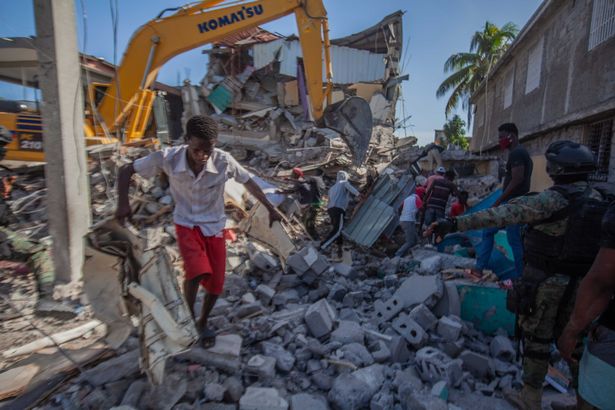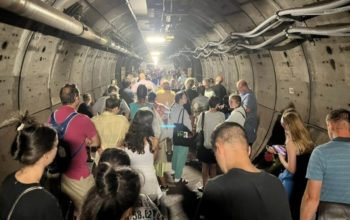Updated 08/17/2021 4:50PM
Around 1.2 million people, including 540,000 children, have been impacted by the 7.2-magnitude earthquake which struck southwestern Haiti on Saturday morning, according to UNICEF.
The quake left at least 1,419 people dead and more than 6,900 injured; that toll is expected to rise in the coming days, but search and rescue efforts are being hampered by a lack of resources and by heavy rains, which have caused mudslides that blocked roads in the region.
Tropical Storm Grace, which hit the same region late Monday “is further disrupting access to water, shelter, and other basic services,” UNICEF said in a statement Tuesday. “Flooding and mudslides are likely to worsen the situation of vulnerable families and further complicate the humanitarian response.
“On Tuesday, donor countries and humanitarian organizations increased efforts to help the country. The Pentagon announced it had formed a joint task force to assist USAID in disaster relief efforts, while the United Nations allocated $8 million in aid to Haiti, according to a statement by United Nations Secretary-General Antonio Guterres. Read more from Cable News
Subscribe here
Death nears 1300 as tropical storm approache
Updated 08/16/11:35AM
Rescue workers and doctors with little equipment worked feverishly to save victims of the deadly earthquake in western Haiti on Monday as a powerful storm threatened to unleash flooding and further snarl aid efforts.
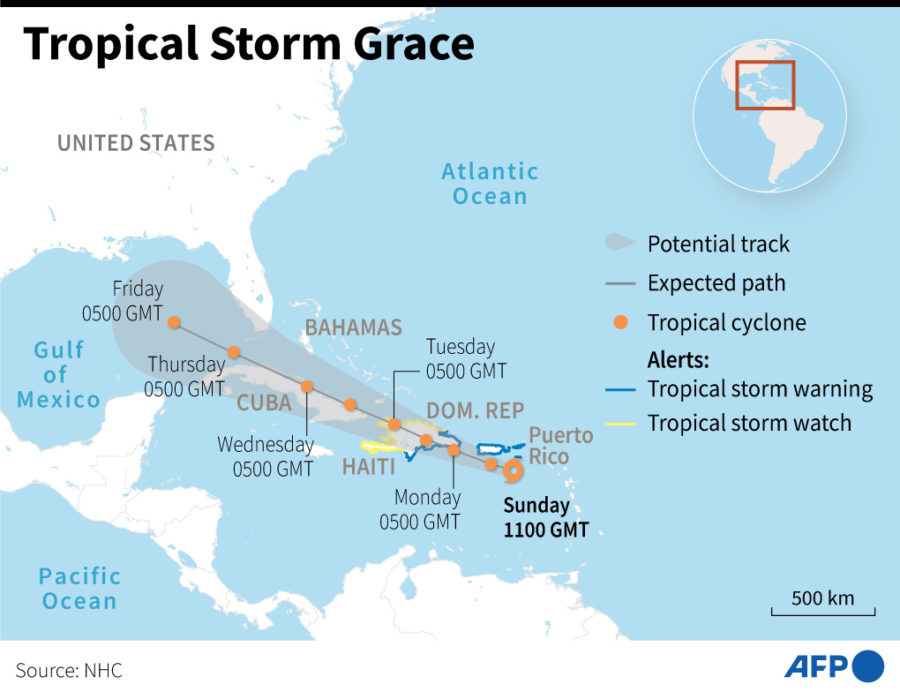
“We’re pleading for help,” Marie-Helen L’Esperance, mayor of the harbor town of Pestel, told Haiti’s Pacific Radio. “Every house was destroyed, there’s nowhere to live, we need shelters, medical help and especially water. We’ve had nothing for three days and injured victims are starting to die.”
Tropical Depression Grace was expected to begin lashing Haiti later Monday. L’Esperance said the prospect of heavy rain had “spread fear through residents who had nothing left but to pray.”
The 7.2-magnitude earthquake that struck Saturday morning has killed at least 1,297 people, according to the country’s civil protection office, but that figure was expected to climb. Schools, medical centers, churches, bridges and more than 13,000 homes collapsed in the temblor, which struck a region already battered by Hurricane Matthew in 2016.
The tragedy was the latest for a nation paralyzed by suffering — with a raging covid-19 pandemic, rising gang violence, a brutal economic crisis and the assassination of President Jovenel Moïse last month. Haiti was devastated 11 years ago by another earthquake that reduced the capital to ruins.
UNICEF said it had sent medical kits for 30,000 people to Les Cayes, a city near the epicenter of the quake, but was concerned that gangs operating along the main road from the capital to the southwest could block supplies. The armed groups have agreed to a one-week cease-fire.
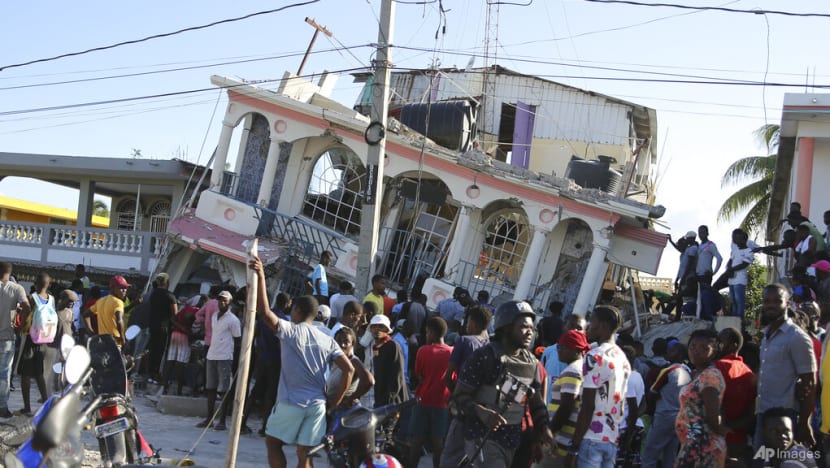
Other aid began to arrive, including a 65-member search-and-rescue team from Fairfax County, Va., dispatched by USAID. The U.S. Coast Guard was ferrying injured victims from the south and west of Haiti to the capital, Port-au-Prince. Mexico, the Dominican Republic, Cuba and Colombia also sent humanitarian assistance and rescue workers.
David Geleste, a doctor in the seaside city of Baladeres, called the situation there “catastrophic.”
“Medical help is urgently needed,” he told Radio Caribe. “It’s critical in the first two to four days. We have many injured with fractured limbs and need to mobilize basic materials like painkillers, bandages, braces. We have to perform urgent operations but don’t have the equipment.” Read more from WP
From 08/15/2021 9:09AM
The death toll from a powerful magnitude 7.2 earthquake in Haiti climbed sharply on Sunday, with at least 724 dead and a minimum of 2,800 injured.
Drone footage
Updated 3:39 PM 08/15/2021
The updated figures from Haiti’s Office of Civil Protection follow a previous count of 304 dead. The office’s director, Jerry Chandler, said rescuers are continuing to search for possible survivors under the rubble.
People in the Caribbean island nation rushed into the streets to seek safety and to help help rescue those trapped in the rubble of collapsed homes, hotels and other structures.
Saturday’s earthquake struck the southwestern part of the hemisphere’s poorest nation, almost razing some towns and triggering landslides that hampered rescue efforts in two of the hardest-hit communities. The disaster added to the plight of Haitians who were already grappling with the coronavirus pandemic, a presidential assassination and a wave of gang violence.
The epicenter of the quake was about 78 miles west of the capital of Port-au-Prince, the U.S. Geological Survey said. The widespread damage could worsen by early next week, with Tropical Storm Grace predicted to reach Haiti late Monday or early Tuesday, bringing torrential rains.
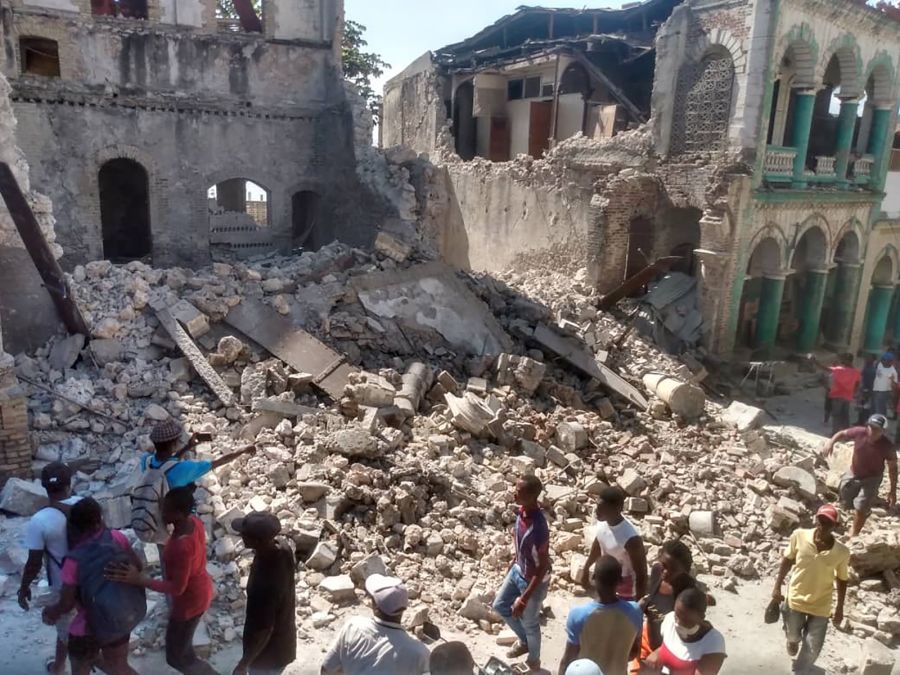
Aftershocks were felt throughout the day and through the night, when many people now homeless or frightened by the possibility of their fractured homes collapsing on them stayed in the streets to sleep — if their nerves allowed.
In the badly damaged coastal town of Les Cayes, some families salvaged their few belongings and spent the night at an open-air football pitch. On Sunday morning, people lined up to buy what little was available: bananas, avocados and water at a local street market.In the badly damaged coastal town of Les Cayes, some families salvaged their few belongings and spent the night at an open-air football pitch. On Sunday morning, people lined up to buy what little was available: bananas, avocados and water at a local street market.
Some in the town praised God for surviving the earthquake, and many went to the city’s cathedral, which appeared outwardly undamaged even if the priests’ residence was destroyed. Read more from CBS
From 9:09 AM 08/15/2021
Powerful 7.2 earthquake in Haiti
A powerful earthquake has struck the Caribbean nation of Haiti, killing at least 304 people and injuring more than 1,800.
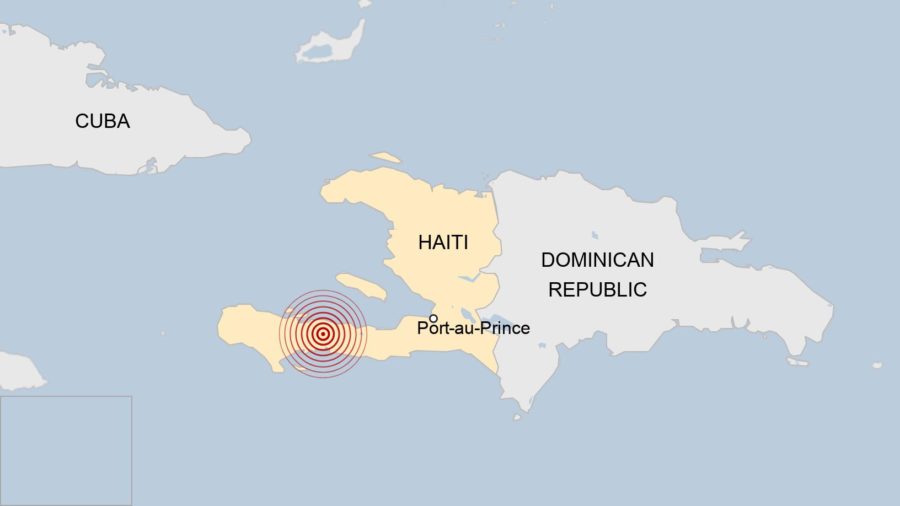
The 7.2-magnitude quake hit the west of the country on Saturday morning, toppling and damaging buildings including churches and hotels.
The prime minister said there was “extensive damage” and declared a month-long state of emergency.
Haiti is still recovering from a devastating 2010 earthquake.
The epicentre of Saturday’s quake was about 12km (7.5 miles) from the town of Saint-Louis du Sud, the US Geological Survey (USGS) said.
The tremor was felt in the densely-populated capital of Port-au-Prince, some 125km away, and in neighbouring countries.
“Lots of homes are destroyed, people are dead and some are at the hospital,” Christella Saint Hilaire, who lives near the epicentre, told AFP news agency.
Prime Minister Ariel Henry said he had mobilised a team to work on the relief effort.
“The most important thing is to recover as many survivors as possible under the rubble,” he said. “We have learned that the local hospitals, in particular that of Les Cayes, are overwhelmed with wounded, fractured people.”
Mr Henry later revealed he had flown in a plane over the city of Cayes.
US President Joe Biden has authorised an “immediate US response” to help Haiti and said USAID would work to support efforts to “assess the damage and assist efforts to recover those who were injured and those who must now rebuild”.
“In what is already a challenging time for the people of Haiti, I am saddened by the devastating earthquake,” he said.
The USGS earlier warned that the earthquake could result in thousands of fatalities and injuries. It also said several aftershocks had been felt in the region, including one measuring 5.8 magnitude.
Frantz Duval, editor-in-chief of Haiti’s Le Nouvelliste newspaper, tweeted that two hotels were among the buildings destroyed in the town of Les Cayes. He said the local hospital was overwhelmed.
“Slowly, strongly and for very long seconds the earth shook in Haiti on 14 August, 2021 around 8:30 am,” he wrote.
Reporters at Le Nouvelliste later said the majority of churches and hotels on the south coast had collapsed or suffered major damage.
Archdeacon Abiade Lozama, head of an Episcopal church in Les Cayes, told the New York Times: “The streets are filled with screaming. People are searching, for loved ones or resources, medical help, water.”
Photos shared on social media showed damaged buildings and piles of rubble after the quake.
Leila Bourahla, Haiti director of Save the Children, told the New York Times it would take days to assess the damage but “it is clear that this is a massive humanitarian emergency”. Read more from BBC

